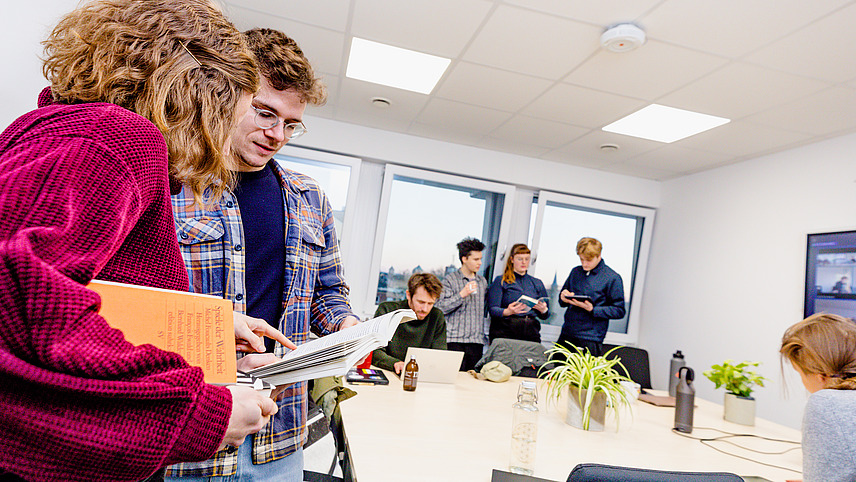Projects
These are our current and completed projects:
- Predicted Futures? - since April 2024
- Data Ethics Outreach Lab
- “SIMPORT” - BMBF project - completed

Predicted futures?
Funded by the "zukunft.niedersachsen" program of the Ministry of Science and Culture, Lower Saxony, our new project "Predicted Futures?" started in April 2024. We are delighted to have Theater Osnabrück and Kunsthalle Osnabrück at our side as cooperation partners.
The project looks at the concept of predicted futures from two perspectives: On the one hand, we focus on the social and societal impact of predictions in predictive analytics. Secondly, we offer a critical examination of the narrative of technological determinism by presenting technology and society as interwoven processes. Through intergenerational dialogues, we want to encourage young people in particular to play an active role in shaping AI technologies.
The following components have been successfully implemented as part of the project:
Workshops with school classes
In cooperation with Theater Osnabrück, which is staging the dystopian science fiction play "(R)Evolution" by Yael Ronen and Dimitrij Schaad in the current season, we offer workshops for school classes to delve deeper into the topics covered. Together with the students, we work on the ethical challenges that predictive AI poses to the democratic constitution and formulate alternative, more desirable technical future scenarios. This work is accompanied by our "Data Ethics Outreach Lab" study project. Cognitive Science Master's students gain practical knowledge in the conception, implementation and scientific evaluation of workshops. The workshop concepts developed are then prepared as **Open Educational Resources**, freely accessible teaching materials that teachers can use for school lessons.
Completed:
Kick-off event 'KI Macht Zukunft? Interactive panel discussion on Tuesday, June 11, 2024
Workshop - critical, visionary and playful discussion on Saturday, August 24, 2024
Data Ethics Outreach Lab
The Data Ethics Outreach Lab is an interdisciplinary course for student teachers and master students of cognitive science.
How does the data collected by Instagram and YouTube promote social inequality? How are social relationships (re)structured by Snapchat, TikTok and co. and how are the opportunities for young people to assume and perform identities online restricted? What does PayPal do with the data it collects from money transfers? Why do chatbots lead to the reinforcement of stereotypical gender roles? And what does my missing bus ticket have to do with being refused credit?
Further information can be found on the project website at rainermuehlhoff.de.
Details of our DEOL course
These are just a handful of possible points of view from which central topics of digital consumer culture can be critically examined. Many of these points have to do with big data and the AI services we use every day. In most cases, users have no awareness of the negative impact on our society, democracy and well-being.
In this study project, we want to discuss risks and societal impacts of networked digital services and find ways and formats to raise public awareness of these issues. The participants will work in small groups on different topics - depending on which areas of technology and issues seem most important to them. The groups can also choose from a range of different outreach formats: developing and using open-source teaching materials for use in secondary schools; organizing workshops (teacher training) in the autumn; producing explanatory videos for publication on the Internet; designing websites, social media channels and other interventions in public spaces.
The project is funded by the "zukunft.niedersachsen" program of the Ministry of Science and Culture, Lower Saxony.
Completed projects
Rainer Mühlhoff led the philosophical sub-project on "Ethics of Interaction Design" in the interdisciplinary network SIMPORT - Sovereign and Intuitive Management of Personal Location Information. It dealt with data ethics, data protection and self-determination in the context of GPS data on smartphones.
Our goal was empowering human-machine interaction when accessing GPS data and sensitizing users to inferential analyses that can be created based on such data. Together with partners from IT and industry, our sub-project developed an ethics by design approach for the participatory implementation of responsible technology design.
Further information can be found on the project website at simport.net.
The BMBF funded the project as part of the Human-Technology Interaction for Digital Sovereignty program line.
The project was a joint collaboration between the Institute for Geoinformatics (ifgi) at Münster University, the Institute for Society and Digitality (GUD) at Münster University of Applied Sciences, Osnabrück University, Reedu GmbH & Co KG and HERE. SIMPORT was part of the Digital Autonomy Hub.